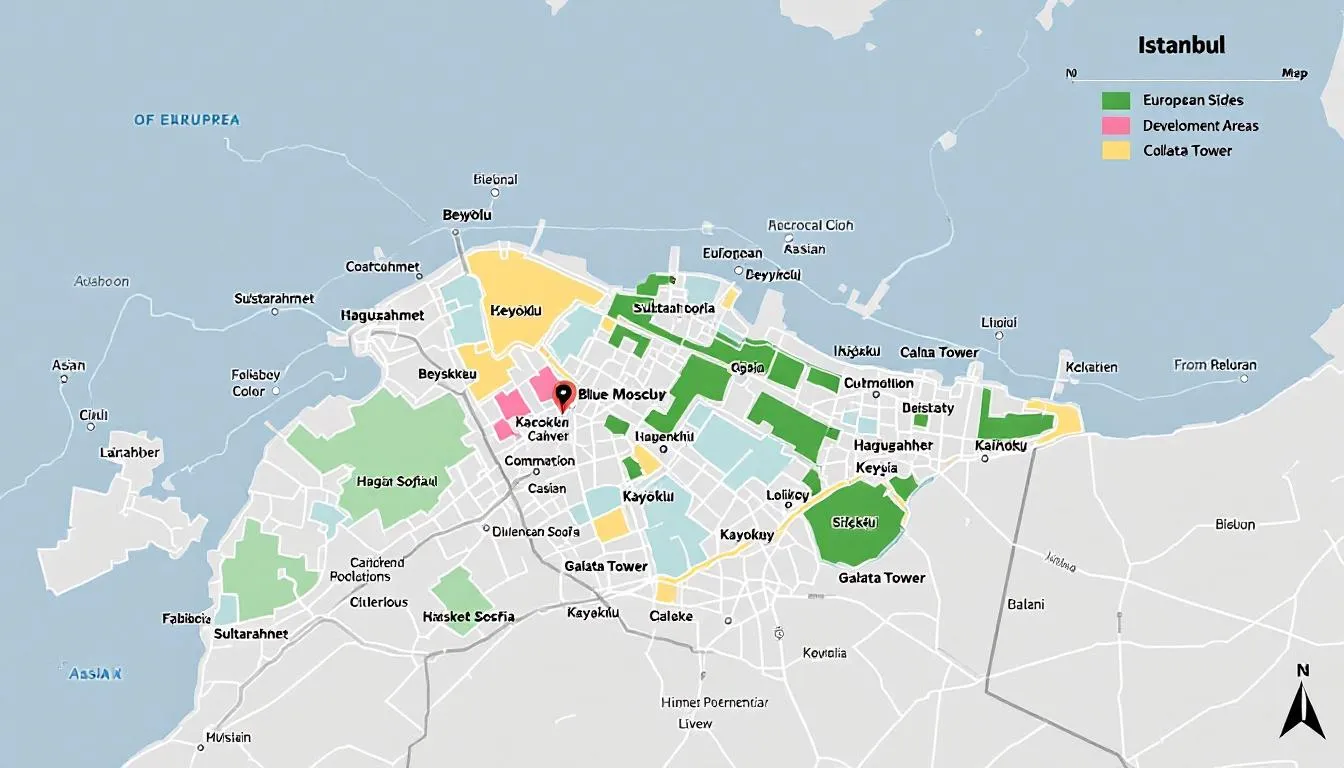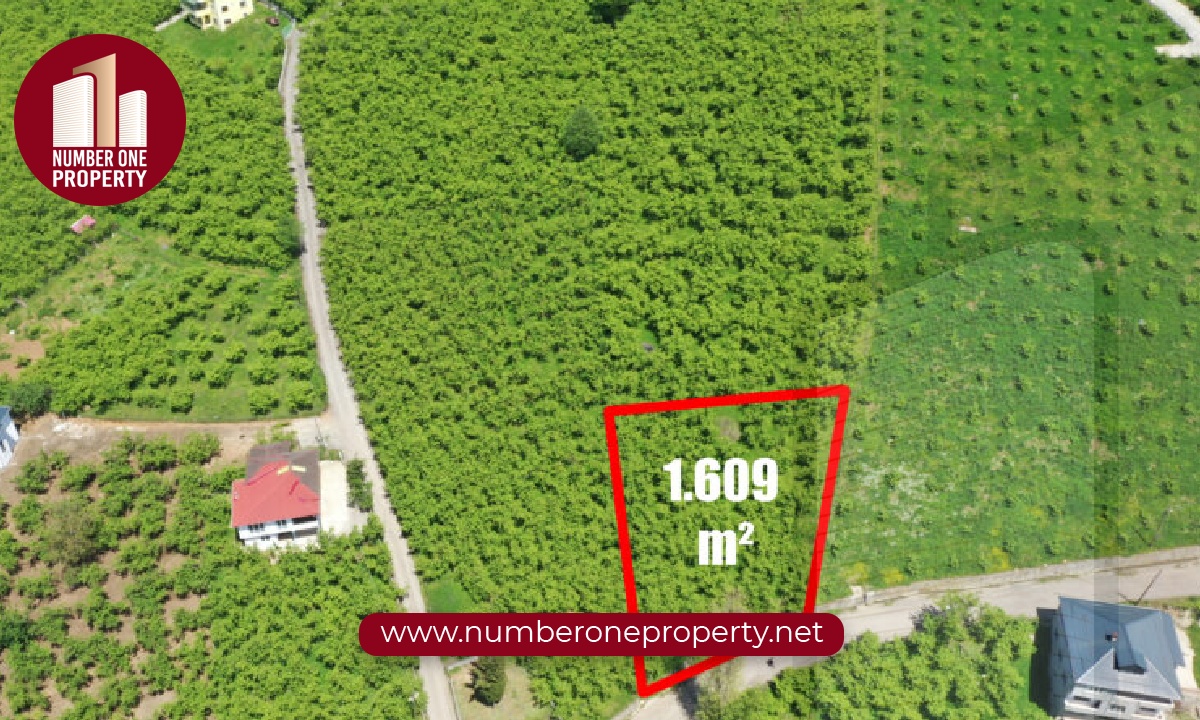Istanbul’s real estate market has experienced remarkable growth, with land prices surging over 400% between 2021 and 2025. For foreign investors, buying land in Istanbul presents compelling opportunities for capital appreciation, Turkish citizenship eligibility, and access to one of Europe’s most dynamic property markets. However, navigating the legal requirements, investment procedures, and market complexities requires careful planning and a thorough understanding of Turkish property laws.
This comprehensive guide walks you through everything you need to know about Buying Land in Istanbul as a foreign national, from legal requirements and step-by-step processes to prime investment areas and financial considerations.
Overview of Land Ownership in Istanbul

Foreign nationals can legally purchase land in Istanbul, though specific restrictions and requirements apply. The Turkish legal framework permits foreigners to buy most types of land, including residential plots, commercial properties, and agricultural land, subject to reciprocity agreements between Turkey and the buyer’s home country.
The legal framework governing foreign land ownership includes several key limitations. Foreign buyers are restricted to a maximum of 30 hectares per person, while foreign ownership in any single district cannot exceed 10% of the total area. Additionally, military zones, border areas within 20 kilometers of international boundaries, and certain strategic coastal regions remain off-limits to foreign investors.
Different land classifications come with varying regulations. Residential land plots (arsa) are generally the most straightforward for foreign buyers, while agricultural land requires specific commitments to agrarian projects. Commercial development land often involves additional zoning considerations and permit requirements.
One significant advantage for foreign buyers is that land purchases can qualify for Turkish residence permits with investments of $75,000 or more. Additionally, investments exceeding $400,000 may lead to eligibility for Turkish citizenship. This makes buying land in Istanbul particularly attractive for investors seeking long-term residency or citizenship benefits.
The Turkish real estate market has shown consistent growth, particularly in emerging districts where infrastructure projects drive land value appreciation. Understanding these dynamics is crucial for making informed investment decisions.
Legal Requirements for Foreign Buyers
Before purchasing land in Istanbul, foreign nationals must complete several mandatory legal requirements. The process begins with obtaining a Turkish tax number (vergi numarası) from the local tax office, which serves as your official identification for all property transactions in Turkey.
Opening a turkish bank account is essential for documenting official currency exchange transactions. Turkish authorities require proof that foreign currency was properly converted through authorized banks, making this step non-negotiable for legal compliance.
Foreign buyers must also complete a military clearance application, which involves security approval from relevant Turkish authorities. This process typically takes 2-4 weeks and requires submitting personal information, passport details, and the specific land location for review.
Verifying the land title deed at the land registry office represents another critical requirement. This step ensures a clean ownership history and confirms that the property is eligible for foreign ownership. The title deed (Tapu) contains essential information about zoning status, any existing liens, and legal restrictions.
For remote purchases, foreign buyers need a notarized power of attorney with apostille certification from their home country. This document must be translated into Turkish by a sworn translator and allows a designated representative to complete the transaction on your behalf.
Additionally, foreign buyers must obtain a foreigner identity number from Turkish authorities, which differs from the standard tax number and is specifically required for property ownership documentation.
Step-by-Step Buying Process
The land purchase process in Istanbul follows a structured sequence that foreign investors must carefully navigate. Starting with proper research and professional guidance ensures a smooth transaction and protects your investment.
Research and Selection Phase
Begin by engaging a licensed real estate agent with experience in foreign transactions and a qualified lawyer specializing in Turkish property law. These professionals provide essential guidance through complex regulations and help identify suitable land plots that meet your investment criteria and intended use requirements.
Due Diligence and Documentation
Conduct thorough due diligence on the land’s legal status, zoning classifications, and any restrictions that might affect your intended use. Verify that the property is eligible for foreign ownership and check for any outstanding debts, liens, or legal disputes that could complicate the purchase.
Contract and Payment Terms
Sign a preliminary sales contract that outlines purchase terms, deposit requirements, and completion timelines. This contract, while not legally binding like the final title deed transfer, establishes mutual commitments and protects both parties during the transaction process.
Currency Exchange and Valuation
Complete the required currency exchange at a turkish bank, obtaining the Currency Purchase Document that proves legal foreign currency conversion. Simultaneously, obtain a certified property appraisal from an approved valuation company to establish the property’s official market value.
Title Deed Transfer
The final step occurs at the Tapu office, where the actual title deed transfer takes place. Both buyer and seller (or their authorized representatives) must be present with all required documentation, including passports, tax numbers, military clearance, and currency exchange certificates.
Post-Purchase Requirements
After completing the land purchase, register for compulsory earthquake insurance (DASK) and arrange utility connections if applicable. These steps ensure full legal compliance and prepare the property for future development or use.
Prime Investment Areas in Istanbul

Istanbul’s diverse districts offer varying investment opportunities, each with distinct characteristics, price points, and growth potential. Understanding these regional differences helps foreign investors select land that aligns with their investment strategy and budget.
Beylikdüzü and Başakşehir Districts
These rapidly growing districts near the new Istanbul Airport represent excellent opportunities for long-term appreciation. Land prices in these areas typically range from $800-1,500 per square meter, making them accessible for many foreign investors while offering significant growth potential as infrastructure continues developing.
The proximity to Istanbul Airport and planned metro extensions make these districts particularly attractive for commercial development and residential projects. Many plots in these areas are already zoned for construction, reducing regulatory hurdles for development projects.
Yenişehir and Canal Istanbul Corridor
The planned Canal Istanbul project has created substantial interest in the Yenişehir area and surrounding districts. Land values in this corridor have already begun appreciating as investors anticipate the massive infrastructure investment. However, buyers should carefully verify zoning status and environmental impact assessments before purchasing.
Agricultural land in this region offers opportunities for future reclassification as urban development expands. However, remember that agricultural project requirements must be fulfilled within two years of purchase.
Central Districts: Kadıköy and Şişli
Established central areas like Kadıköy on the european side and Şişli offer premium land values with prices often exceeding $3,000-5,000 per square meter. These districts provide stability and immediate rental yields potential but require larger investment amounts.
Central areas typically offer easier access to utilities, transportation, and existing infrastructure, making them suitable for immediate development or rental property investments.
Emerging Areas: Arnavutköy and Silivri
For investors seeking affordable entry points, districts like Arnavutköy and Silivri offer agricultural and development land options starting from $500-800 per square meter. These areas require longer investment horizons but may provide substantial returns as Istanbul’s urban expansion continues.
Many plots in these districts are suitable for luxury villas or agricultural projects, appealing to investors seeking sea views or rural development opportunities.
Costs and Financial Considerations
Understanding the complete cost structure is essential for budgeting your land purchase effectively. Beyond the land’s purchase price, several mandatory fees and taxes significantly impact your total investment.
| Cost Category | Amount | Notes |
|---|---|---|
| Title deed transfer tax | 4% of declared value | Often split between buyer/seller |
| VAT | Up to 18% | Applies to development projects |
| Legal fees | $1,000-2,000 | Approximately 1% of property value |
| Property appraisal | $300-500 | Required for financing |
| Annual property tax | 0.1%-0.3% | Based on location and use |
| Real estate commission | ~2% | Standard agent fees |
The title deed transfer tax represents the largest mandatory cost, calculated as 4% of the property’s declared value. This tax is often negotiated between buyer and seller, though foreign buyers frequently pay the full amount.
VAT may apply to certain types of land purchases, particularly those intended for commercial development or new construction projects. Residential development projects typically face lower VAT rates, while commercial projects may incur the full 18% rate.
Legal fees for qualified representation typically range from $1,000-2,000, depending on the transaction complexity and property value. Given the legal complexities involved in foreign land purchases, professional legal representation is strongly recommended rather than optional.
Annual ongoing costs include property taxes ranging from 0.1% to 0.3% of the assessed value, depending on the land’s classification and location. Central areas and commercial properties generally face higher tax rates than agricultural or residential land in outer districts.
Real estate agent commissions typically amount to approximately 2% of the purchase price, though this can be negotiated. Agents provide valuable services including market knowledge, legal guidance, and transaction coordination that often justify their fees.
Financing Options and Banking
turkish banks offer various financing options for foreign land purchases, though requirements and terms differ significantly from domestic lending programs. Understanding these options helps investors leverage their capital more effectively.
Major turkish banks, including İş Bankası, Akbank, and Garanti BBVA, offer mortgages covering 50%-70% of the property value for qualified foreign buyers. Loan terms typically range from 5-15 years, with interest rates currently ranging from 6%-9% annually, though rates fluctuate based on economic conditions.
Down payment requirements generally range from 30%-50% of the land value, significantly higher than domestic buyer requirements. Banks require extensive documentation including proof of income, employment verification, tax returns, and existing debt obligations from your home country.
Monthly debt service payments are typically limited to 40% of documented monthly income, requiring borrowers to demonstrate substantial and stable income sources. Self-employed individuals face additional documentation requirements and may need to provide audited financial statements.
Some banks offer specialized programs for foreign investors seeking turkish citizenship through property investment. These programs may provide more favorable terms for purchases exceeding the $400,000 citizenship threshold.
Alternative financing options include developer financing for land intended for immediate construction projects. Some developers offer payment plans allowing buyers to spread costs over 12-24 months, though interest rates may be higher than traditional bank financing.
Currency risk represents a significant consideration for foreign borrowers. Most loans are denominated in Turkish lira, meaning borrowers with foreign currency income face exchange rate exposure throughout the loan term.
Land Use Classifications and Restrictions
Turkish land classification systems significantly impact what you can do with your purchased property. Understanding these classifications before buying helps ensure your intended use aligns with legal requirements.
Residential Land (Arsa)
Residential land plots are designated for housing development and typically offer the most flexibility for foreign buyers. These properties usually have existing zoning permits and utility access, making them suitable for immediate construction of private homes or small residential projects.
Most residential land in established districts comes with clear title deeds and defined building rights, specifying maximum construction area, height restrictions, and setback requirements.
Commercial Land
Commercial development land allows business, retail, or mixed-use projects subject to obtaining proper permits. These properties often command higher prices due to income-generating potential but require more complex planning and permit processes.
Zoning regulations for commercial projects vary significantly by district, with some areas limiting building heights, parking requirements, or specific business types allowed.
Agricultural Land
Agricultural land purchases require foreign buyers to establish an agricultural project within two years of purchase. This can include farming operations, livestock raising, or agricultural processing facilities.
Converting agricultural land to other uses typically requires government approval and reclassification, which can be time-consuming and uncertain. However, agricultural land often offers the lowest purchase prices and may be suitable for long-term holding strategies.
Construction on agricultural land is generally prohibited except for structures directly related to farming activities, such as barns, equipment storage, or processing facilities.
Zoning and Permit Considerations
Before purchasing any land, verify its zoning status and ensure it matches your intended use. Zoned land (imarlı) has construction rights, while unzoned land (imarsız) may face significant restrictions or require lengthy approval processes for development.
Many areas of Istanbul are undergoing urban transformation (kentsel dönüşüm), which can dramatically change land values and development opportunities. Stay informed about planned infrastructure projects and zoning changes that might affect your investment.
Market Trends and Investment Outlook
The Istanbul land market has demonstrated remarkable resilience and growth, particularly following the significant price appreciation from 2021-2025. Understanding current trends and future projections helps investors make informed decisions about timing and location.
Current land prices vary dramatically by location and classification. Outer districts like Silivri and Çatalca offer entry points around $500-800 per square meter, while prime central areas in Şişli or Beşiktaş may exceed $4,000-5,000 per square meter for developable plots.
Infrastructure projects continue driving regional appreciation patterns. The new Istanbul Airport, ongoing metro expansions, and the proposed Canal Istanbul project create corridors of enhanced value, though investors should carefully evaluate completion timelines and potential delays.
Short-term Market Projections (2025-2026)
Market analysts expect moderate growth in the near term, with land price increases of 5-10% annually as macroeconomic conditions stabilize. This represents a significant slowdown from the dramatic appreciation of previous years but suggests continued positive momentum.
Foreign investment has decreased slightly due to increased citizenship investment thresholds and global economic uncertainty. However, this may create opportunities for investors willing to enter during a relatively calm period.
Long-term Outlook Through 2030
Istanbul’s position as Turkey’s economic center and continued population growth support positive long-term fundamentals. The city’s role as a bridge between Europe and Asia, combined with ongoing infrastructure investments, suggests continued appreciation potential.
Emerging districts show the highest appreciation potential as urban expansion continues. Areas currently classified as agricultural may see reclassification opportunities as the city grows, though this requires longer investment horizons and higher risk tolerance.
Central areas offer more stability and immediate utility but may see slower appreciation rates due to already high valuations and limited development space.
Investment Strategy Considerations
Successful land investment in Istanbul typically requires 3-5 year minimum holding periods to realize significant gains. Shorter-term strategies face higher transaction costs and market volatility risks.
Diversification across multiple districts or land types can help balance risk and return potential. Many successful investors combine prime central plots with emerging area purchases to balance stability and growth potential.
Common Mistakes and How to Avoid Them

Foreign investors frequently encounter preventable problems that can result in significant financial losses or legal complications. Learning from these common mistakes helps protect your investment and ensure a smooth purchase process.
Inadequate Legal Due Diligence
Many buyers fail to thoroughly verify land title deed authenticity and legal status before completing purchases. Always engage qualified lawyers to conduct comprehensive title searches, verify ownership history, and confirm the property’s eligibility for foreign ownership.
Skipping proper legal verification can result in purchasing land with existing liens, legal disputes, or ownership complications that may take years and substantial legal fees to resolve.
Ignoring Zoning and Use Restrictions
Purchasing land without understanding zoning classifications and intended use restrictions represents another costly mistake. Verify that your planned use matches the land’s legal classification and confirm any permit requirements for your intended project.
Agricultural land purchases particularly require understanding the mandatory agricultural project requirements. Failing to establish qualifying projects within two years can result in forced sale requirements.
Inadequate Professional Representation
Attempting to navigate the purchase process without qualified local representation often leads to complications. Engage licensed real estate agents with foreign transaction experience and qualified lawyers specializing in Turkish property law.
Using unqualified or inexperienced professionals can result in missed deadlines, improper documentation, or failure to complete required procedures correctly.
Improper Payment Documentation
Turkish law requires specific documentation for foreign currency conversion and payment processing. Using cash payments or informal transfer methods can create legal complications and may violate currency regulations.
Always complete payments through official banking channels and maintain proper documentation of currency exchange transactions. This documentation is required for title deed registration and future property sales.
Overlooking Ongoing Obligations
Many foreign buyers focus solely on the purchase process without understanding ongoing obligations such as property taxes, insurance requirements, or agricultural project commitments.
Budget for annual property taxes, compulsory earthquake insurance, and any maintenance or development obligations associated with your land classification.
Rushing the Purchase Process
Pressure to complete transactions quickly often results in inadequate due diligence or missed legal requirements. Allow sufficient time for proper verification, documentation, and legal procedures.
Most successful land purchases require 2-3 months from initial agreement to final title deed transfer, allowing time for all necessary procedures and verifications.
Professional Services and Support
Successfully purchasing land in Istanbul requires assembling a qualified team of local professionals who understand both Turkish regulations and foreign investor needs. The right professional support significantly improves your chances of a successful transaction while protecting your interests.
Qualified Real Estate Agents
Look for real estate agencies with specific experience serving foreign clients and documented track records in land transactions. The best agents provide comprehensive market knowledge, regulatory guidance, and ongoing support throughout the purchase process.
Certified agents should hold valid licenses from Turkish authorities and demonstrate familiarity with foreign ownership regulations, zoning requirements, and local market conditions in your target areas.
Many successful agents offer bilingual services and maintain relationships with qualified lawyers, banks, and other service providers essential for completing transactions efficiently.
Specialized Legal Representation
Turkish property law requires specialized knowledge that general practice lawyers may not possess. Seek lawyers with specific expertise in foreign property transactions, zoning regulations, and title deed procedures.
Qualified lawyers conduct comprehensive due diligence, verify legal documentation, ensure compliance with all requirements, and represent your interests during the title deed transfer process.
Legal fees typically represent a small percentage of your total investment but provide essential protection against costly mistakes or legal complications that could arise from improper procedures.
Certified Property Appraisers
Official property valuations from approved appraisal companies are required for financing and may be necessary for citizenship applications. These appraisers understand local market conditions and provide valuations that satisfy both banking and government requirements.
Professional appraisals also provide important market intelligence about comparable properties, recent sales data, and realistic value expectations for your target area.
Remote Purchase Services
For investors unable to travel to Istanbul frequently, many agencies offer comprehensive remote purchase services using properly authorized power of attorney arrangements.
These services include property identification, due diligence coordination, legal representation, and transaction completion on your behalf. However, ensure any power of attorney documents meet Turkish legal requirements and are properly notarized and apostilled.
English-Speaking Professional Networks
Many international investors benefit from working with established professional networks that cater specifically to foreign clients. These networks often include coordinated teams of agents, lawyers, accountants, and other specialists who work together regularly.
Established networks can streamline communication, reduce coordination challenges, and provide comprehensive guidance throughout the entire purchase process and beyond.
Banking and Financial Services
Several turkish banks maintain specialized departments for foreign investors, offering dedicated relationship managers who understand international banking requirements and can facilitate mortgage applications efficiently.
These specialized banking relationships often provide faster processing times, better communication, and more flexible documentation requirements compared to standard retail banking channels.
The complexity of buying land in Istanbul requires professional guidance, but the right team makes the process manageable while protecting your investment interests. Investing in qualified professional services typically pays for itself through smoother transactions, reduced risks, and better long-term outcomes.
Foreign investment in Istanbul’s land market offers compelling opportunities for capital appreciation, residency benefits, and portfolio diversification. However, success requires thorough preparation, qualified professional guidance, and careful attention to legal requirements and market dynamics.
The key to successful land investment lies in thorough due diligence, proper legal procedures, and realistic expectations about timelines and returns. Istanbul’s continued growth and infrastructure development support positive long-term prospects, but individual success depends on careful property selection and professional execution of the purchase process.
Whether you’re seeking residential development opportunities, commercial investment potential, or agricultural projects, Istanbul’s diverse land market offers options for various investment strategies and budget levels. The essential information provided in this guide serves as your foundation, but engaging qualified local professionals remains crucial for navigating the complexities successfully and protecting your investment interests.
Read Also:
Benefits of Land Investment in Turkey



